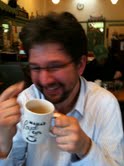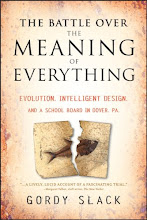 We fill in blind spots all the time to keep our perception of the world flowing and making sense. Earlier this week I interviewed Stanford neuroscientist Ben Barres, who recounted a staggering feat of such patching.
We fill in blind spots all the time to keep our perception of the world flowing and making sense. Earlier this week I interviewed Stanford neuroscientist Ben Barres, who recounted a staggering feat of such patching. An elderly patient was brought into the ER by her family because she'd been "bumping into things and acting strange." Barres, a Cornell medical resident at the time, gave her a full neurological exam, which she passed with flying colors, until, that is, he asked her how many fingers he held up. "Five," she said. He’d been holding up three. He kept his hand down and asked again. "Three," she said. Barres passed his hand near the patient’s face; she didn’t blink. "How's your vision?" he asked. "Fine," she said. But her vision wasn't fine. She was totally blind.
A recent stroke had whacked her visual cortex so that although her brain was getting visual data, it couldn’t interpret it. The stroke had also cut off communication between the visual cortex and the speech-language areas of the brain causing a kind of cortical blindness called Anton’s syndrome. The patient could not see a thing, but she didn’t know it yet. And, not believing she was blind, the patient’s brain invented a plausible visual "patch," from other sensory data… and a strong dose of imagination. "The power of denial," says Barres, "is also at play." (I guess so!) Amazing the hoops the brain goes through to fill in blind spots (in this case, the entire visual field) and preserve a coherent, and tolerable, picture of the world.

